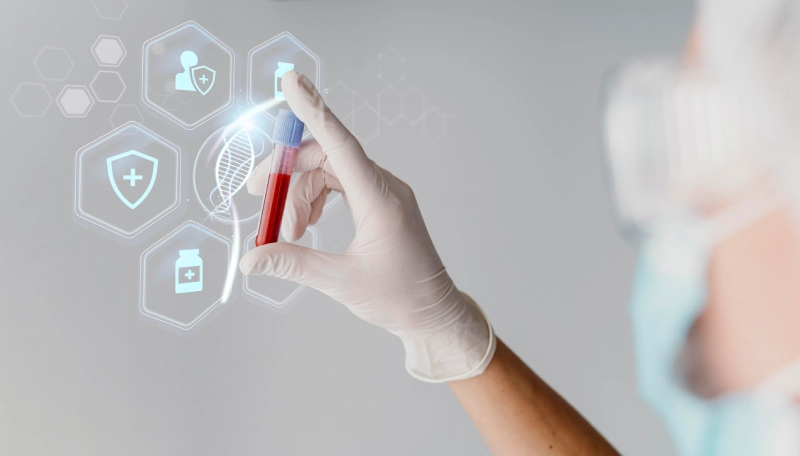
Immunology
The Immunology department at Rejath Lab focuses on the study and diagnosis of disorders related to the immune system. It plays a crucial role in identifying immune-related diseases, such as autoimmune disorders, immunodeficiencies, hypersensitivities, and infections. By analyzing immune responses through various tests, this department aids in diagnosing, monitoring, and managing conditions that impact the immune system's ability to defend the body against diseases.
Key Functions and Capabilities:
Autoimmune Disease Testing: Immunological tests are essential in diagnosing autoimmune diseases, where the body’s immune system mistakenly attacks its own tissues and organs.
- Antinuclear Antibody (ANA) Test:
- Purpose: Detects antinuclear antibodies, which target the nuclei of cells.
- Clinical Use: Used to diagnose autoimmune diseases such as systemic lupus erythematosus (SLE), scleroderma, and mixed connective tissue disease.
- Anti-DNA Antibody Test:
- Purpose: Detects antibodies that target the patient’s own DNA.
- Clinical Use: Helps confirm the diagnosis of systemic lupus erythematosus (SLE), particularly when there is kidney involvement.
- Rheumatoid Factor (RF) and Anti-Cyclic Citrullinated Peptide (Anti-CCP) Antibody:
- Purpose: Detects antibodies associated with rheumatoid arthritis (RA).
- Clinical Use: Essential for diagnosing RA and distinguishing it from other inflammatory arthritic conditions.
- Anti-Double-Stranded DNA (Anti-dsDNA) Antibody Test:
- Purpose: Detects antibodies specifically against double-stranded DNA.
- Clinical Use: A key marker for lupus nephritis in systemic lupus erythematosus.
Immunodeficiency Screening: Tests in immunology can help diagnose primary (inherited) or secondary (acquired) immunodeficiencies, which impair the body's ability to fight infections.
- Immunoglobulin Quantification (IgG, IgA, IgM, IgE):
- Purpose: Measures the levels of various immunoglobulins (antibodies) in the blood.
- Clinical Use: Detects immunodeficiencies (such as common variable immunodeficiency) or hyperimmune states (such as allergic reactions).
- Flow Cytometry for Lymphocyte Subset Analysis:
- Purpose: Evaluate the number and function of specific lymphocyte subsets, including T cells, B cells, and natural killer (NK) cells.
- Clinical Use: Diagnoses immunodeficiencies (e.g., severe combined immunodeficiency or SCID), HIV infection, and lymphoproliferative disorders.
- Complement System Tests (C3, C4, CH50):
- Purpose: Measures the levels and activity of complement proteins, which are part of the immune response.
- Clinical Use: Helps diagnose conditions like hereditary angioedema, lupus, and other diseases affecting the complement system.
Allergy Testing: Immunology tests can identify specific allergens that cause allergic reactions, aiding in the diagnosis of allergic diseases.
- Total and Specific IgE Testing:
- Purpose: Measures the total levels of IgE antibodies and specific IgE antibodies in response to various allergens.
- Clinical Use: Diagnoses allergic conditions such as allergic rhinitis, asthma, eczema, food allergies, and drug allergies.
- Allergy Panel Testing:
- Purpose: Tests for multiple common allergens (e.g., pollen, mold, dust mites, animal dander, and food allergens) simultaneously.
- Clinical Use: Helps identify specific allergens causing allergic reactions and guides treatment or allergy desensitization.
- Hypersensitivity Reactions: Tests in this area are used to diagnose hypersensitivity disorders, where the immune system overreacts to certain substances or stimuli.
- Patch Testing:
- Purpose: Identifies substances that cause delayed hypersensitivity (Type IV) reactions.
- Clinical Use: Helps diagnose contact dermatitis and other delayed allergic reactions to metals, fragrances, or chemicals.
- Skin Prick Test:
- Purpose: Identifies substances that cause delayed hypersensitivity (Type IV) reactions.
- Clinical Use: Helps diagnose contact dermatitis and other delayed allergic reactions to metals, fragrances, or chemicals.
Infectious Disease Immunology: These tests help determine whether a patient has been exposed to infectious agents and the immune system’s response to the infection.
- HIV Antibody/Antigen Testing:
- Purpose: Detects antibodies and antigens to diagnose HIV infection.
- Clinical Use: Early diagnosis and monitoring of HIV, as well as assessing immune function in infected patients.
- Cytomegalovirus (CMV) and Epstein-Barr Virus (EBV) Serology:
- Purpose: Detects antibodies to these viruses to determine past or current infection.
- Clinical Use: Diagnoses infectious mononucleosis, and assesses CMV risk in immunocompromised patients, including organ transplant recipients.
- Tuberculosis (TB) Interferon Gamma Release Assays (IGRAs):
- Purpose: Measures the immune response to Mycobacterium tuberculosis.
- Clinical Use: Diagnoses latent or active TB, particularly in individuals who have received the BCG vaccine, as it does not cross-react with it.
Vaccine Response Testing: Tests that determine the effectiveness of vaccinations and whether the immune system has developed protective antibodies.
- Hepatitis B Surface Antibody Test (HBsAb):
- Purpose: Measures the presence of antibodies to the hepatitis B virus, indicating immunity.
- Clinical Use: Determines immunity post-vaccination or recovery from hepatitis B infection.
- Rubella, Measles, and Mumps Antibody Testing:
- Purpose: Detects antibodies against these viruses to confirm immunity.
- Clinical Use: Important for assessing immunity, especially in pregnant women or healthcare workers.
Transplant Immunology: Testing plays a vital role in ensuring successful organ and tissue transplantation by minimizing the risk of rejection.
- HLA Typing:
- Purpose: Identifies human leukocyte antigens (HLA) to match organ donors and recipients.
- Clinical Use: Critical for organ and bone marrow transplantation compatibility and minimizing graft rejection.
- Panel Reactive Antibody (PRA) Testing:
- Purpose: Detects antibodies that could react against donor tissues.
- Clinical Use: Helps assess the likelihood of organ rejection and the necessity for pre-transplant desensitization.
Cancer Immunology: Tests in this field help in the diagnosis and monitoring of certain cancers by analyzing immune system markers.
- Tumor Marker Testing (CA-125, PSA, CEA):
- Purpose: Measures specific proteins produced by cancer cells or in response to cancer.
- Clinical Use: Used for cancer detection, monitoring treatment response, and assessing cancer recurrence risk.
Advanced Techniques and Technology:
Rejath Lab's Immunology department employs cutting-edge technology such as enzyme-linked immunosorbent assays (ELISA), flow cytometry, chemiluminescent immunoassays (CLIA), and automated immunology analyzers. These technologies ensure precise, reliable, and rapid test results. The lab follows rigorous quality control standards to maintain accuracy in all immunological tests.
